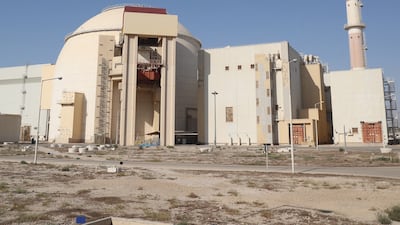A new deal to restrict Iran's nuclear programme and lift US sanctions could be announced within days.
After nearly a year of negotiations between Iran, Germany, China, Russia, France, the EU, the UK and the US, delegates in Vienna say a resolution could be close.
Diplomats have intensified talks in the Austrian capital, holding meetings through the night and pushing to seal a deal as the Russia and Ukraine crisis looms over the talks.
Iran's chief negotiator in Vienna, Ali Bagheri Kani, wrote on Twitter overnight that a deal was closer than ever.
But he also wrote: “Nothing has been agreed until everything has been agreed. Realism, refraining from extravagance and paying attention to the experience of the last four years is necessary to achieve this goal.”
Seyed Mohammad Marandi, another member of the Iran team in Vienna, said an agreement could be reached “within days”. While Iranian officials have shown optimism, they insist that the US must offer a guarantee that there is no repeat of 2018 ― when former president Donald Trump withdrew the US from the nuclear deal ― once President Joe Biden leaves office.
The US, which is negotiating with Iran indirectly, has been unable to offer such a guarantee.
Iran's Foreign Minister Hossein Amirabdollahian says a guarantee is essential.
In an interview with the Financial Times newspaper, he said: “Iran’s commitments are as clear as a mathematical formula. It is absolutely clear what we are supposed to do and how these measures will be verified through the IAEA [the UN nuclear watchdog]. Therefore the other side can have no concern; but we remain concerned primarily about the guarantees [that the US would not withdraw].”
The sense of urgency in Vienna has also been made clear by other negotiating teams. China, France and the US have said the next one or two days will be critical, if not the home stretch, for the negotiations.
France's Foreign Minister Jean-Yves Le Drian told his country's parliament that talks “have reached tipping point now”.
“It's not a matter of weeks, it's a matter of days,” he said.
Deal 'will have to be in the coming days'
In Washington, State Department spokesman Ned Price said he believed Tehran's seriousness for a new deal would be shown in the next few days.
“It will have to be in the coming days because, again, we’re in a decisive period where all sides will have to make the political commitments that will be necessary if we are to achieve a mutual return to compliance with the JCPOA [Joint Comprehensive Plan of Action],” Mr Price said.
The Chinese and Russian negotiators at the talks both called for a sense of urgency.
Both have been critical in the latest round of talks, and unlike the E3 or the EU, have taken a much more substantive role in enabling indirect talks between the US and Iran.
The US has continued to offer direct talks with Iran, which has said such a process is a possibility should a deal come close.
“Our last response to Americans and intermediaries was: any direct dialogue, contact and negotiation with the US would have very huge costs for my government,” Mr Amirabdollahian told the Financial Times.
“We are not ready to enter into the process of direct talks with the US if we do not have a clear and promising outlook to reach a good agreement with sustainable guarantees in front of us.”
In Washington, 200 Republican politicians have signed a letter warning Mr Biden that any nuclear deal made with Iran without congressional approval “will meet the same fate” as the 2015 agreement by former president Barack Obama, later abandoned by Mr Trump.
While significant pushback is expected by Republicans in Congress, the Biden administration is continuing talks in an effort to avoid escalation with Iran.
While negotiations will continue in Vienna, both Secretary of State Antony Blinken and Mr Amirabdollahian are expected at the weekend's Munich Security Conference and there has been speculation about the possibility of them holding talks on the sidelines.


